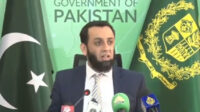Interfaith Exchange is a multimedia initiative which seeks to produce accessible and engaging interfaith dialogue in order to tackle intolerance, hatred and discrimination and instead encourage mutual respect and understanding.
Its mission is to interact with the world’s youth so that they may carry forward interfaith tolerance in their careers as leaders and policy makers, as well as into their relationships as people.
Interfaith Exchange held their first webinar on the subject, “Interfaith Dialogue in Lockdown: Fashioning Future Leaders” held on Monday 17th August, 2020. The subject was selected by Interfaith Exchange because of the unique challenges and opportunities for interfaith dialogue that have arisen as a result of the COVID-10 pandemic and lockdown and how these may be tackled by adults for the benefit of producing a future generation of well-rounded and tolerant people. The discussion, moderated by Raahim Zafar, Co-founder of Interfaith Exchange, began with a speech from each speaker followed by a session of questions and answers.
Dr Hussain Nadim, CEO of The Nerve Center in Pakistan, argued that understanding the role of interfaith dialogue demands looking at the past. He identified the root of the tension between East and West as lying in the differing emphasis on contrasting aspects of identity. States like Pakistan have tended to ground their identity on religion versus the more secular emphasis on nationality that originates in the Westphalian order. Since 9/11, Dr Nadim suggests that new hotspots have been established in which religion has become central to governance and the state. In terms of interfaith dialogue, he claimed that the following things ought to be considered: the content of the dialogue, its organisers and the narratives it addresses. The pandemic highlighted to Dr Nadim that despite humanity being divided along superficial lines of religion, all people “have the same blood” which makes us equally susceptible to the virus. He thus called on the youth to engage in dialogue through new technologies in order to better interact with and understand one another. For Dr Nadim, differences are a good thing and we should “appreciate what divides us.”
Mary Hunter, a postgraduate research fellow and Co-founder of Interfaith Exchange, focused on the challenges and opportunities that the lockdown has presented for interfaith dialogue. In terms of challenges, Miss Hunter suggested that the lockdown has exacerbated inter-religious tensions as various communities have accused others of breaching lockdown rules and spreading the virus. She suggested that this is a result of fear and suspicion which exists due to a lack of interfaith dialogue which in turn will be adopted by the youth who will further perpetuate rather than challenge inter-religious tension. But she also identified the opportunities, such as how initiatives like this webinar would not have occurred which have increased the accessibility of interfaith dialogue. Moreover, she identified how her generation and those in the future are naturally inclined not only to utilise new technologies but to engage with a diverse range of people via social media which will see the encouragement of dialogue. In order to produce a religiously tolerant youth, Miss Hunter concludes by claiming that adults must be the change they want to see embodied in future generations.
Barrister Rubab Mehdi Rizvi, who has not only been awarded for her interfaith work but organised her first event aged just 13 years old, began with the assertion that interfaith dialogue is key to peace among religions and thus peace among nations. But the reality today is one of religious inequality in which minorities suffer. In presenting the legal position of the Universal Declaration of Human Rights, Rubab Mehdi suggests that the equality of all people in terms of rights, the freedom of religion and its practice are guaranteed under law. She also draws special attention to Pakistan, under the Constitution of which all citizens are equal in the eyes of the law. The fundamental issue then for Rubab Mehdi is that people lack knowledge of one another and only have opinions and that it is thus incumbent on the people to learn in order to prevent religious coercion and encourage tolerance. She identifies Islam as per Babar’s autobiography, that Islam is best served by the “sword of kindness, not by the sword of oppression” and that friendship will overpower the voices of religious hatred and bigotry.
Porter Clements, also a Co-founder of Interfaith Exchange, described how lives are being led in a religious sense through the lockdown and how religious institutions respond despite the exacerbation of pre-existing issues, such as the growing individualisation of the youth. With a particular focus on his tradition of Zen Buddhism, Mr Clements suggested that faith is communal as well as individual and that religious institutions, such as Zen River in the Netherlands, have had to adapt to the challenges of the lockdown. For example, no longer are religious services bound by location because institutions live stream worship or even meditation retreats. Mr Clements characterised Zen River as the “paradigmatic example of globalised religion today” because, though it has managed to maintain a sense of community during the lockdown, it also has an ageing population which reflects the global issues of whether religious institutions alienate young people.
In the question and answer session, discussion was equally stimulating and interesting. Here are some of the key questions and their respective answers:
Q to Mary: How would you characterise your agnosticism, given that some would claim it’s the cowardly option and others would suggest it shows humility?
Mary: “There’s still an issue about the way we interact with each other, like at university… there was a lot of judgement on people who were religious and also believers have a lot of judgement for non-believers. But I think this is the kind of tension that goes both ways… I think this can be improved through interfaith dialogue.”
Q to Rubab: How does your religion motivate you to be courageous in your activism for the oppressed?
Rubab: “It is my faith that inspires me to speak for all oppressed and not to think of people from the lens of ‘othering’ them… there are no others when it comes to human rights… It is my duty to stand with the poor, it is my duty to stand with the persecuted…”
Q: How important is it to have meaningful interfaith conversations with a variety of people in order to create a harmonious society?
Porter: “… starting on the level of person to person is really the only way to get anywhere… I would challenge the notion that there is such thing as a ‘Christian,’ or there is such thing as a ‘Jew,’ or that there is such thing as a ‘Buddhist…’ We practice our religions in distinct ways…”
Hussain: “… we were born and raised after 9/11… so we saw what happened and how something miserable that happened in New York, it didn’t end over there, it had a direct effect on millions of people in our country… for four years that I was going back to the US, every single time somehow I was the only one getting “randomly selected” for a racial layer of security.”
Stay tuned to Baaghi TV for the latest news, updates, and interesting analysis.






